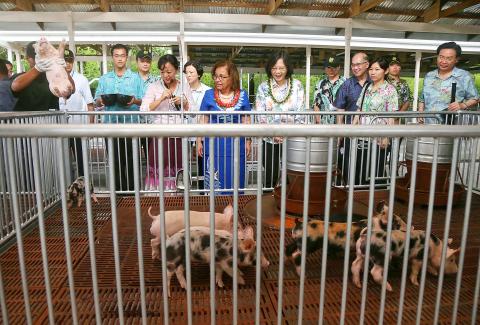Taiwan will soon grant visa waivers to the nationals of its six diplomatic allies in the Pacific, President Tsai Ing-wen (蔡英文) announced yesterday.
Addressing the Marshallese legislature, Tsai said she believes the decision will further enhance Taiwan’s relations with the six: the Marshall Islands, Kiribati, Nauru, the Solomon Islands, Palau and Tuvalu.
Tsai said her administration’s “steadfast diplomacy” policy, with a focus on “mutual assistance for mutual benefits,” is aimed at strengthening bilateral cooperation and substantial ties with diplomatic allies to develop relationships that are reciprocal and mutually beneficial.

Photo: CNA
Taiwan has taken steps to enhance its exchanges with the Marshall Islands, such as in the area of education, Tsai said, adding that a Taiwan-Marshall Islands presidential scholarship program was officially launched on Monday.
She said Taiwan also attaches great importance to sustainable development and is committed to helping the Marshall Islands promote food security and a healthy diet, with considerable progress having been made on farming and animal husbandry.
For example, Taiwan’s agriculture technical corps in the Marshall Islands has provided swine breeding stock to farmers for free and has trained seed instructors who are responsible for teaching pig-raising techniques to the farmers, she said.
Taiwan has helped the Marshall Islands build “green” farms, where waste produced on the farms is recycled and reused, she added.
She assured the Marshall Islands that it will always have Taiwan’s support in the fight against climate change.
Tsai also mentioned the Austronesian culture shared by both nations.
Council of Indigenous Peoples Minister Icyang Parod and Democratic Progressive Party Legislator Kolas Yotaka, an Amis Aborigine, are among the members of her delegation, hoping to deepen mutual exchanges and understanding using Austronesian culture as a medium, Tsai said.
Tsai is in the Marshall Islands after a two-night stay in Hawaii, and is scheduled to visit Tuvalu and the Solomon Islands before making a transit stop on the US territory of Guam, on Friday.
She is to return home on Saturday.

An essay competition jointly organized by a local writing society and a publisher affiliated with the Chinese Communist Party (CCP) might have contravened the Act Governing Relations Between the People of the Taiwan Area and the Mainland Area (臺灣地區與大陸地區人民關係條例), the Mainland Affairs Council (MAC) said on Thursday. “In this case, the partner organization is clearly an agency under the CCP’s Fujian Provincial Committee,” MAC Deputy Minister and spokesperson Liang Wen-chieh (梁文傑) said at a news briefing in Taipei. “It also involves bringing Taiwanese students to China with all-expenses-paid arrangements to attend award ceremonies and camps,” Liang said. Those two “characteristics” are typically sufficient

A magnitude 5.9 earthquake that struck about 33km off the coast of Hualien City was the "main shock" in a series of quakes in the area, with aftershocks expected over the next three days, the Central Weather Administration (CWA) said yesterday. Prior to the magnitude 5.9 quake shaking most of Taiwan at 6:53pm yesterday, six other earthquakes stronger than a magnitude of 4, starting with a magnitude 5.5 quake at 6:09pm, occurred in the area. CWA Seismological Center Director Wu Chien-fu (吳健富) confirmed that the quakes were all part of the same series and that the magnitude 5.5 temblor was

The brilliant blue waters, thick foliage and bucolic atmosphere on this seemingly idyllic archipelago deep in the Pacific Ocean belie the key role it now plays in a titanic geopolitical struggle. Palau is again on the front line as China, and the US and its allies prepare their forces in an intensifying contest for control over the Asia-Pacific region. The democratic nation of just 17,000 people hosts US-controlled airstrips and soon-to-be-completed radar installations that the US military describes as “critical” to monitoring vast swathes of water and airspace. It is also a key piece of the second island chain, a string of

The Central Weather Administration has issued a heat alert for southeastern Taiwan, warning of temperatures as high as 36°C today, while alerting some coastal areas of strong winds later in the day. Kaohsiung’s Neimen District (內門) and Pingtung County’s Neipu Township (內埔) are under an orange heat alert, which warns of temperatures as high as 36°C for three consecutive days, the CWA said, citing southwest winds. The heat would also extend to Tainan’s Nansi (楠西) and Yujing (玉井) districts, as well as Pingtung’s Gaoshu (高樹), Yanpu (鹽埔) and Majia (瑪家) townships, it said, forecasting highs of up to 36°C in those areas